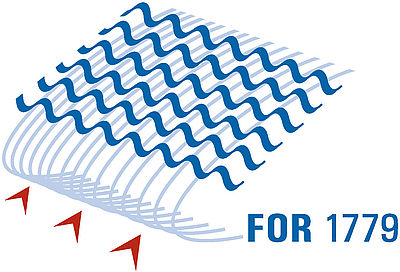Symposium Nov. 2015
In 2011 the German Research Association (DFG) launched a research group on "Active Drag Reduction via Wavy Surface Oscillation" which combines scientists from the fields of control theory, fluid mechanics, metal forming, and electronics. The main long-term objective of this program is the development of a simple, yet energy efficient method to influence the turbulent boundary layer such that drag is minimized reduction by active or a combination of active and passive means. To satisfy this goal 7 projects have been defined in the different areas of control theory, fluid mechanics, metal forming and electronics. In each of these projects scientists collaborate in several experimental and numerical investigations to improve the fundamental knowledge of the underlying physical mechanisms of drag reduction, a possible control approach, and the feasibility in terms of manufacturing such an actuated system.
First announcement and general information:
Symposium about Active Drag Reduction
An interdisciplinary symposium organized by the DFG funded research group FOR1779, RWTH Aachen University and FZ Jülich
9-10 November Novotel Aachen
- 1. Day: Symposium 8:30 a.m. until 6:15 p.m.
- 2. Day: Symposium 8:15 a.m. until 2:00 p.m.
Detailed Program: Flyer

Organizing Committee:
- Wolfgang Schröder
- Dirk Abel
- Wolfgang Dahmen
- Michael Klaas
- Siegfried Mueller
- Matthias Meinke
- Sepfan van Waasen
- Michael Schiek
Invited external speakers:
- Prof. Steven L Ceccio, University of Michigan: Passive and Active Skin Friction Drag Reduction in Turbulent Boundary Layers
- Prof. Maurizio Quadrio, Politecnico di Milano: Turbulent drag reduction by spanwise forcing
- Prof. Koji Fukagata, Keio University:Turbulent friction drag reduction by streamwise and spanwise traveling waves
- Dr. Shervin Bagheri, Royal Institute of Technology (KTH): Flow control research at KTH
- Prof. Eugênio B. Castelan, Universidade Federal de Santa Catarina: On Control and Network Systems
- Dr. Mihailo Jovanovic, University of Minnesota: Dynamics and control of wall-bounded shear flows
- Dr. Pierre Ricco, University of Sheffield: Turbulent drag reduction by hydrophobic surface with shear-dependent slip length
- Dr. Alfonso Caiazzo, Weierstrass Institute for Applied Analysis and Stochastics: Multiscale modeling of elastic materials in harmonic regime and application to microscale structure estimatio
- Prof. Bernd Noack, Université de Poitiers (University of Poitiers): Closed-loop turbulence control using machine learning